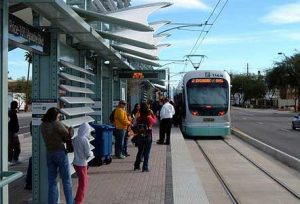Despite a recent surge of transit cuts affecting bus routes throughout Tempe and Chandler, light rail is gliding toward a brighter future.
Valley Metro officials are moving forward with a 3.1-mile Central Mesa light rail extension through downtown Mesa to Mesa Drive, after receiving environmental clearance from the Federal Transit Administration last month.
“It’s a milestone in the overall project development,” said Hillary Foose, public information officer for Valley Metro.
“This was required to understand the extension’s effect on its neighboring environment and to continue to compete for federal grant dollars.”
The good news for south Tempe and west Chandler residents: There is still hope for a bus rapid transit system connecting Kyrene Corridor residents to light rail.
“When we evaluated this (project) we did see great value in a bus rapid transit on Rural Road,” Foose said. ‘This is still something we would really like to pursue, but funding is currently not in place for that program.”
Chandler residents currently can board bus rapid transit and take it past the U.S. 60 to Main Street, where park-and-ride options are available.
In February, the Mesa light rail extension project was recommended to receive $38 million in the president’s budget for 2012, securing federal support for the transit system.
“We are continuing to move forward under the good assumption that we will get some level of support,” Foose said.
The $38 million is yet to be confirmed by Congress because the budget has not officially passed, Foose said.
“There’s just a lot of discussion happening at the federal level,” she said. “It’s all part of the budget and their grant programs.”
Foose said Metro officials are confident the project will continue to receive the federal support it needs to complete the Mesa extension.
“We assume half will come from federal sources, and the other half will come from (revenues generated by) the Proposition 400 sales tax,” she said. “We are requesting $75 million from FTA Small Starts, with $38 million as the first installment.”
Additionally, Foose said, the project capital cost of the extension is approximately $200 million, with about $80 million generated from Proposition 400 and $45 million from a federal grant supporting projects that positively impact air quality.
Residents can expect to see construction get under way next year.
“We expect to break ground with utility relocation next spring or summer – that’s really the first phase of the construction,” Foose said.
“We are nearing 60 percent of engineering the design.”
Construction is expected through 2015, with operations beginning in 2016.
“This fall, there will be more public engagement as we move forward with the project,” Foose said. “There will be more questions on how we can take full advantage of the system.”
Foose said there will most likely be slight adjustments to current bus routes once the extension is in operation.
Information: http://www.valleymetro.org/


